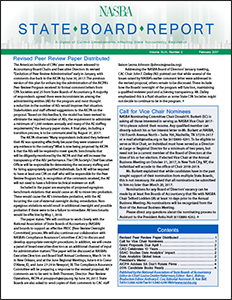State Board ReportFebruary 2017The American Institute of CPAs’ peer review team released to Accountancy Board Chairs and Executive Directors its revised “Evolution of Peer Review Administration” early in January, with comments due back to the AICPA by June 30, 2017. The previous version of this plan for enhancing the administration of the AICPA’s Peer Review Program received 30 formal comment letters from CPA Societies and 25 from State Boards of Accountancy. A majority of respondents agreed there were inconsistencies among the administering entities (AE) for the program and most thought a reduction in the number of AEs would improve that situation. Stakeholders and staff offered suggestions to the AICPA on the proposal. “Based on this feedback, the model has been revised to eliminate the required number of AEs, the requirement to administer a minimum of 1,000 reviews annually and many of the AE staffing requirements,” the January paper states. A final plan, including a transition process, is to be communicated by August 31, 2017. The AICPA observes: “Many respondents indicated they believed their AE was operating effectively because they were unaware of any evidence to the contrary.” What is now being proposed by AICPA is that the AEs will be required to meet specific benchmarks that will be diligently monitored by the AICPA and that will increase the transparency of the AEs’ performance. The CPA Society’s Chief Executive Officer will be responsible for determining the necessary staffing and for hiring appropriately qualified individuals. Each AE will be required to have at least one CPA on staff who will be responsible for the Peer Review Program but, in recognition of the comments received, the AE will not need to have a full-time technical reviewer on staff. The paper states: “We will continue to work closely with the National Association of State Boards of Accountancy (NASBA) and boards to support an effective PROC [Peer Review Oversight Committee] process. We will also continue our collaboration with NASBA’s Compliance Assurance Committee (CAC) to discuss and develop appropriate oversight procedures. In addition, we will create a panel of board executive directors as an additional channel of input for administrative matters.” The paper will be discussed at NASBA’s Executive Directors and Board Staff Annual Conference, March 14-16 in New Orleans, and at the June Regional Meetings, June 6-8 in Coeur D’Alene, ID, and June 27-29 in Newport, RI. The Compliance Assurance Committee will be preparing a response to the revised proposal. All comments are to be sent to Beth Thoresen, Director- Peer Review Operations, AICPA at [email protected] by June 30, 2017. State Boards are also asked to send copies of their comments to CAC staff liaison Leona Johnson ([email protected]). Addressing the NASBA Board of Directors’ January meeting, CAC Chair John F. Dailey (NJ) pointed out that while several of the issues raised by NASBA’s earlier comment letter were addressed in the revised proposal, others remain to be discussed. These include how the Boards’ oversight of the program will function, maintaining a qualified reviewer pool and achieving transparency. Mr. Dailey emphasized this is a fluid situation as some State CPA Societies might not decide to continue to be in the program. |
Related NewsFull Issue |

